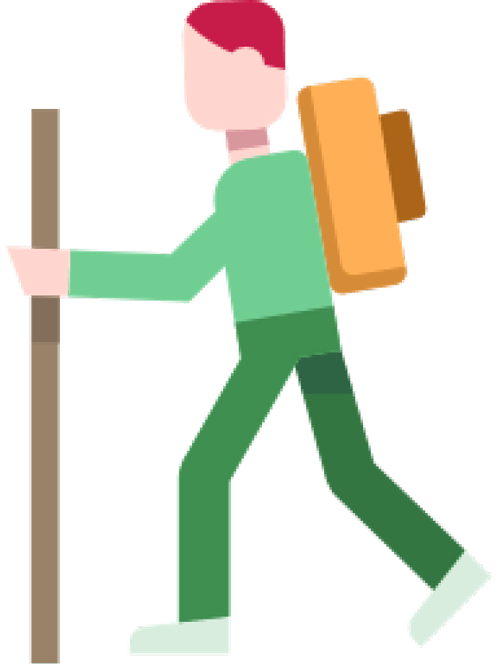Outdoor Recreation
Outdoor Recreation
What is it? 
Outdoor recreational activities include boating, camping, fishing, hiking, biking, off-highway vehicle use, horseback riding, swimming and tubing. Such activities are valuable for many reasons. They can improve our physical and mental health, and inspire us to appreciate and value our natural ecosystems. They can also bring economic benefits to communities. Businesses, like rafting companies, can create jobs and increase tourism. Perhaps most importantly, however, recreational activities are valuable because they allow people to enjoy and appreciate the Bow River Basin’s generally high quality of water.
How does outdoor recreation influence water quality in the Bow River Basin?
Outdoor recreation affects sediment and can increase erosion:
- When recreationalists (e.g., hikers, bikers, horseback riders and motorized vehicle users) do not use a bridge to cross waterways (rivers or creeks), they can disturb sediment and cause it to be carried downstream. If the river or creek has an exposed stream bank, the amount of disturbed sediment can be even higher.
- Frequently used hillside trails are at a higher risk of damage, including soil disturbance or loss of vegetation. When this damage occurs, erosion (from rain or snowmelt) increases, contributing to higher levels of sediment in waterways.
- Vehicles with large tire treads can destroy vegetation and churn up the soil, resulting in increased erosion from rain or snowmelt.
- Increased sediment in waterways causes difficulties for water treatment facilities.
- Increased sediment in waterways affects the habitat of fish and aquatic insects.
Recreation increases the types and amounts of substances found in water:
- Sunscreen and insect repellent from swimmers can wash off into the water.
- Gasoline, motor oil, and other vehicular fluids can spill or leak into waterways.
- Improperly managed sanitary waste and garbage can end up in the water.
Recreation can contribute to the problem of aquatic invasive species:
- Boats or fishing gear that are used in multiple bodies of water can transport aquatic invasive species, thereby changing ecosystems and impacting water quality.
What can we do about it?
Spending time outdoors is one of the best ways to stay mentally and physically healthy, and to appreciate the amazing ecological services our natural systems provide. By following these tips, you will help protect these services and ensure the outdoors can be enjoyed for generations to come:
- Stay on designated trails while you are hiking, biking, or riding. Designated trails are designed with bridges, walkways and sufficient space to limit impacts on water.
- Avoid driving vehicles through wetlands or waterways.
- To avoid accidentally transporting invasive species, ensure your boat, trailer, off-highway vehicle, fishing gear and hiking boots are always cleaned, allowing them to dry completely between uses in different water bodies. Fishing gear and boots can be put in a freezer to kill many attached invasive species.
- Utilize designated watercraft inspection stations along highways when returning from boating trips.
- Do not dump human waste into or near water or ice when boating, camping, recreating, or ice-fishing.
- Avoid spilling gas, oil, paint, varnish, or other chemicals when fueling or maintaining your boat or off-highway vehicle.
- Use biodegradable soap and dispose of washing water properly (in designated areas and away from lakes, rivers or creeks).
Where can I find more information?
Limiting Impact of Recreation on Water Quality
Water Quality Basics – What you can do
Paddle Alberta
Alberta Fishing Guide
Sources:
Alberta Environment and Parks. (2017, May 11). Recreation on public land – motorized. Retrieved from: http://aep.alberta.ca/recreation-public-use/recreation-on-public-land/motorized.aspx
Province of Alberta. (2017). Traffic Safety Act – Off-highway Vehicle Regulation. Retrieved from: http://www.qp.alberta.ca/documents/regs/2002_319.pdf
Province of Alberta. (2017, May 15). Revised Statutes of Alberta 2000 Chapter T-6. http://www.qp.alberta.ca/documents/Acts/t06.pdf
Alberta Off-Highway Vehicle Association. http://aohva.com/respect/
